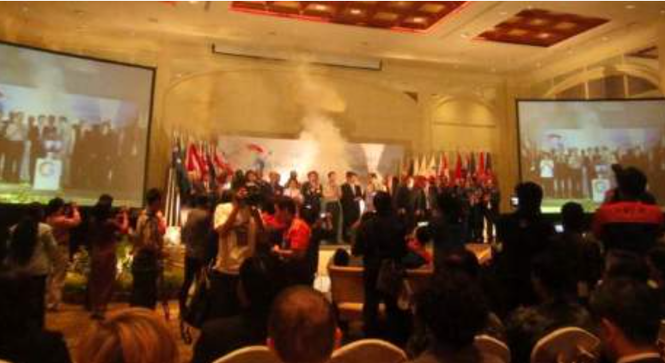
This year’s ASEAN regional forum Disaster Relief Exercise (ARF DiREX 2013) culminated in a resounding message: strong national legal frameworks are fundamental for the receipt of international assistance and increased regional coordination.
From 7-11 May, the district of Cha-am in Phetchaburi Province, Thailand played host to the 3rd ARF DiREX. The high-level event, co-chaired by Thailand and the Republic of Korea, gathered over 1,800 civilian authorities and military actors from over 26 countries, together with National Red Cross and Red Crescent Societies as well as a number of regional and international organisations. Building on the momentum of the two previous forums in 2009 (the Philippines) and 2011 (Indonesia), the ARF DiREX 2013 aimed to enhance civil-military coordination and improve cooperation to provide swift and effective disaster relief.
In opening the event, the Deputy Prime Minister of Thailand, H.E. Dr Plodprasop Suraswadi conveyed a poignant reminder of the importance of preparedness and disaster risk reduction (DRR). Recalling the devastating 2004 Indian Ocean tsunami, he spoke of a young girl from Oregon in the United States, who was on vacation in Thailand. Having been educated about DRR in school, she recognised the receding seawater as a sign of an imminent tsunami, and subsequently led her family to higher ground. Many of the locals were not as fortunate, which led Dr Suraswadi to initiate efforts to increase disaster preparedness in Thailand. Today, Thailand joins a number of countries in the region that have incorporated DRR in the school curriculum.
The ARF DiREX 2013 was comprised of two main sessions: a Table Top Exercise (TTX) and a Field Training Exercise (FTX). Based on a scenario of an 8.9 Richter Sumatran earthquake and a resulting tsunami on the Andaman coast of Thailand, the TTX encouraged participants to share ideas and experiences on existing national, regional and international frameworks and mechanisms for disaster response operations.
During the Expert Session of the TTX, the IDRL Guidelines were brought into focus. Tessa Kelly, Disaster Law Programme Coordinator for Asia-Pacific, delivered a presentation on IDRL and co-facilitated a session on the international response framework.
The exercise generated discussion around the initiation and mobilisation of international assistance including assets, capabilities and limitations, as well as issues concerning civil military coordination. Participants recommended that countries prepare, clarify and share their procedures for receiving, facilitating and distributing international humanitarian aid. Pannapa Na Nan of the Thai Department of Disaster Prevention and Mitigation and TTX co-chair observed that the ARF DiREX “has repeatedly underscored the need for countries to develop, adhere to and operationalize national legislation which identifies a clear point of contact, and includes a structure and process to coordinate and facilitate incoming assistance.”